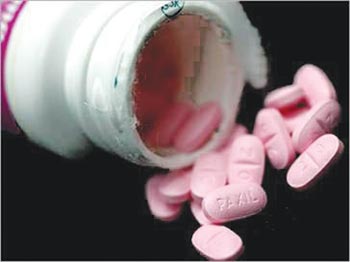Common antidepressant reduces effectiveness of cancer drug tamoxifen
Sharon Kirkey
Paxil, an antidepressant commonly prescribed to women with breast
cancer, can reduce or even abolish the effects of the breast-cancer drug
tamoxifen, increasing a woman’s risk of death, Canadian researchers are
warning.
Published this week in the British Medical Journal, the study exposes
an ‘extremely common’ and potentially life-threatening drug interaction
that is ‘widely underappreciated,’ yet entirely avoidable, the
researchers say.
“For women taking these two drugs together, I think there are better
options for the treatment of depression,” Dr. David Juurlink, a senior
scientist at the Institute for Clinical Evaluative Sciences in Toronto
and one of the study’s authors said in a statement.
|

Paxil |
Breast cancer is the most commonly diagnosed cancer in women
worldwide; an estimated 1.5 million new cases will be diagnosed globally
this year, including about 22,700 in Canada.
Tamoxifen has been used for the treatment of breast cancer for more
than three decades. For women with early stage estrogen
receptor-positive breast cancer, the drug reduces the risk of recurrence
by about half, and the risk of cancer death by about one-third,
according to the study.
“If there was a hall of fame for cancer drugs, tamoxifen would be
there,” Juurlink said in an interview. “It is a spectacularly effective
drug for breast cancer.” But tamoxifen depends on an enzyme in the liver
to activate it. It doesn’t do anything on its own, rather, it has to be
converted to its active metabolite, called endoxifen, to work.
The idea that drugs might interfere with this critical process by
switching the enzyme off dates back roughly 20 years, “but there’s been
very little research on what the real-world consequences of that drug
interaction would be,” Juurlink said.
Antidepressants are especially important because they’re taken not
just for a week or two, but for months and often years.
Up to 25 percent of breast cancer patients develop depression. Many
of them are prescribed selective serotonin reuptake inhibitors, or SSRIs,
a class that includes paroxetine, Paxil and its generics. Along with
other SSRIs, paroxetine is also sometimes prescribed for tamoxifen-related
hot flashes.
The Toronto researchers looked at 2,430 women in Ontario, aged 66 and
older, who were treated with tamoxifen as well as a single SSRI between
1993 and 2005. Among the 2,430 women in the study, 374, or 15 percent,
died of breast cancer during followup.
For each antidepressant, the researchers asked, does combining this
drug with tamoxifen influence the risk of dying from breast cancer? They
found that the use of paroxetine, but not other SSRIs, in combination
with tamoxifen was associated with an increased risk of dying from
breast cancer.
The women in the study were taking an antidepressant, on average, for
nearly half of the time (41 percent) they were also on tamoxifen. The
standard time on tamoxifen therapy is five years.
The team estimates that taking paroxetine for 41 percent of tamoxifen
therapy would result in one additional breast cancer death within five
years for every 20 women so treated.
The more time taking both drugs together, the greater the risk.
Roughly one additional breast cancer death would be expected for
every seven women who took paroxetine the entire time they were taking
tamoxifen.
“Most of the time when we think of the consequences of combining two
drugs, the risks or harms are fairly immediate, the problem happens
within a few days or a few weeks, Juurlink said.
“This is an interaction with consequences that occur far into the
future.” In their study, paroxetine was the most commonly prescribed
SSRI antidepressant.
“Think about the math here,” Juurlink said. “There are a million and
a half new breast cancer cases each year, many of whom will take
tamoxifen. If 25 per cent of them develop depression, and even half of
those receive an SSRI, and paroxetine is the most common agent - we’re
literally talking about thousands of women each year who could be
missing out on the benefits of a tremendously beneficial drug for breast
cancer.”
He warned women not to stop taking paroxetine suddenly. Withdrawal
symptoms can be severe if the drug is stopped abruptly.
But “if women taking tamoxifen need to be on an antidepressant, there
are better choices than paroxetine,” Juurlink said. Drugs such as
venlafaxine (brand name includes Effexor) or citalopram (Celexa) don’t
appear to interfere with tamoxifen “to anywhere near the same degree.”
Canwest News Service |



